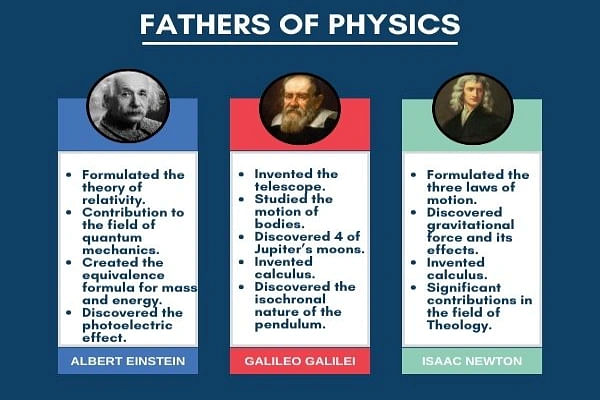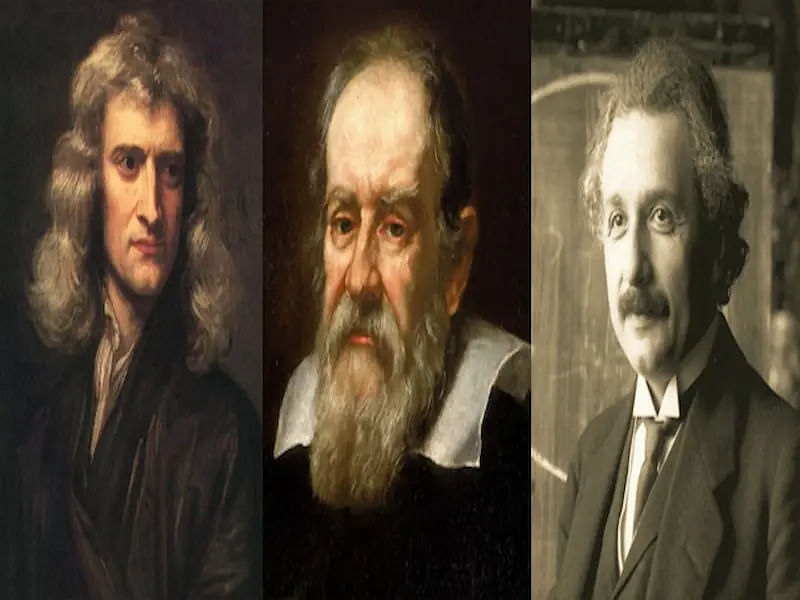Galileo Galilei, Albert Einstein, and Sir Isaac Newton, are each known as the father of Physics. They have made significant contributions in the field of physics through the invention of the telescope, theory of relativity and the laws of motion respectively.
Table of Contents
Galileo Galilei, Albert Einstein and Sir Isaac Newton are each called the Father of Physics as they pioneered many laws in physics. Galileo Galilei was an Italian physicist, mathematician, and astronomer who contributed significantly in the laws of astronomy. Albert Einstein discovered the theory of relativity. Sir Isaac Newton discovered the laws of motion.
The contributions of all three- Galileo Galilei, Albery Einstein, and Isaac Newton - have been significant in the field of Physics. They have pioneered such laws in Physics on which the world is moving today.
Father of Physics: Key Highlights
The key highlights of the fathers of physics can be found in the table below:
|
Highlights |
Galileo Galilei |
Albert Einstein |
Isaac Newton |
|
Birth Date |
Feb 15, 1564 |
Mar 14, 1879 |
Jan 4, 1643 |
|
Early Education |
Matriculated in 1581 from the University of Pisa |
Matriculated in 1896 |
Completed bachelor’s degree in 1665 |
|
Significant Discoveries |
Invented the telescope and discovered the 4 largest moons of Jupiter |
Propounded the quantum mechanics theory and discovered the theory of relativity. Received Nobel Prize in Physics in 1921 for discovery of photoelectric effect |
Discovered the laws of motion and gravitational force |
Also Check: Who is the Father of Biology?
Father of Physics: Educational Background
The title ‘father of physics’ is awarded to all three - Galileo Galilei, Albert Einstein, and Sir Isaac Newton - individually. While Galileo and Newton have been given the title of ‘father of physics’ individually, Albert Einstein has been called the father of modern physics.
The educational background of all 3 fathers of physics has been mentioned below:
Galileo Galilei
The educational background of Galileo Galilei has been mentioned below:
- His schooling was done in the monastery school situated in Vallombrosa, near Florence. He matriculated from the University of Pisa in 1581.
- He had expected to study medicine. However, against the wishes of his father, he chose to study mathematics.
Albert Einstein
The educational background of Einstein can be found below:
- The early education of Einstein faced challenges due to the sickening business of his father.
- In 1894, Einstein was admitted to a boarding school in Munich.
- At the age of 16, he ran away from the boarding school and was considered a school dropout without any employable skills as such.
- In 1911, He applied to the Swiss Federal Polytechnic School in Zurich.
- He went to the high school in Arau and graduated from there in 1896.
Isaac Newton
The educational background of the English mathematician and physicist, Newton has been given below:
- Newton went to the Grammar School situated in Grantham.
- He also learned Latin at school.
- His education was interrupted due to familial issues and so he matriculated in June 1661 at an older age from the Trinity College, Cambridge.
Also Check: Who is the Father of Chemistry?
Important Works of the Fathers of Physics
The fathers of physics have made groundbreaking discoveries in physics. The contribution of each of them is considered a significant breakthrough for the different branches of physics.

Galileo Galilei
Galileo Galilei’s contributions to the astronomical branch of physics is considered groundbreaking.
- He had started his research on the motion of bodies and made significant discoveries on the same. He was among the first few scientists to discover that there is no absolute rest or absolution motion for a body.
- His discoveries regarding the motion of bodies and the invention of the telescope. Using the telescope, Galileo discovered four moons of the planet Jupiter - Ganymede, Io, Europa, and Callisto. He also observed the different phases of Venus and sunspots.
- He studied the principles of sound frequency.
- Galileo Galilei was the first to discover the isochronal nature of the pendulum at nineteen years of age. He had timed the oscillations of a swinging lamp at the Pisa Cathedral.
Albert Einstein
The contributions of Albert Einstein to the field of Physics have been quite large.
- His most significant contribution to Physics is the theory of relativity.
- He also found the equivalence formula for mass and energy (e=mc2).
- He has also contributed to the theory of Quantum Mechanics.
- He discovered the photoelectric effect. In 1921, he was awarded the Nobel Prize in Physics for this discovery.
Sir Isaac Newton
The discoveries made by Newton were considered inventive in the field of Physics.
- Sir Isaac Newton was a physicist and mathematician who discovered the three laws of motion.
- He discovered gravitational force and its effect on the falling bodies.
- He is also accredited with the invention of calculus.
Also Check: Who is the Father of Botany?























POST YOUR COMMENT